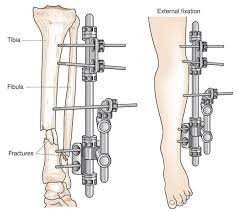A patient with a right lower leg fracture will be discharged home with an external fixation device in place. Which information will the nurse teach?
"Assess the skin under the foam boot twice daily"
"Take prophylactic antibiotics before any dental work for the rest of your life”
"Check and clean the pin insertion sites daily."
"Remove the external fixator for your shower
The Correct Answer is C
Pin site care is essential to prevent infections and other complications associated with external fixation devices. The nurse should instruct the patient to clean the pin insertion sites daily with a sterile saline solution or as per healthcare provider's instructions. The patient should also observe for signs of infection, such as redness, swelling, warmth, and drainage, and report any concerns to the healthcare provider.
Assessing the skin under the foam boot twice daily is not specific to external fixation devices, and it may not be relevant to this patient's care plan. The nurse should focus on teaching the patient about external fixation device care specifically.
Taking prophylactic antibiotics before any dental work for the rest of your life is not relevant to external fixation devices or right lower leg fractures. It is a recommendation for patients with certain heart conditions who may be at risk of developing infective endocarditis during dental procedures.
Removing the external fixator for the shower is not recommended as the device should be kept dry to prevent infections. The nurse should instruct the patient to cover the device with a waterproof dressing or plastic bag during showering to protect it from getting wet.

Nursing Test Bank
Naxlex Comprehensive Predictor Exams
Related Questions
Correct Answer is ["B","C","D","E"]
Explanation
The initial bundle of care in sepsis includes the following:
- Obtain blood cultures: Blood cultures help identify the specific microorganism causing the infection, which is important for guiding appropriate antibiotic therapy.
- Administer broad-spectrum antibiotics: Early administration of antibiotics is crucial in sepsis to target the suspected or likely infectious organisms. Broad-spectrum antibiotics cover a wide range of potential pathogens until more specific information from culture results is available.
- Obtain lactate levels: Measuring lactate levels helps assess tissue perfusion and can be used as an indicator of the severity of sepsis. Elevated lactate levels are associated with tissue hypoperfusion and increased mortality.
- Administer IV fluid bolus: Early aggressive fluid resuscitation is an essential component of sepsis management. Administering intravenous fluids helps restore intravascular volume and improve tissue perfusion.
- Administration of vasopressors: Especially in the setting of hypotension and to maintain MAP above 65mmHg.
Correct Answer is A
Explanation
This statement demonstrates an understanding of proper cast care for itch relief. Using a cool air dryer on a low setting can help circulate air and provide relief from itching under the cast. It is important not to use a hot air dryer as it may cause discomfort, skin irritation, or burn. Trickling water or inserting objects into the cast can lead to moisture accumulation and potential complications.
Whether you are a student looking to ace your exams or a practicing nurse seeking to enhance your expertise , our nursing education contents will empower you with the confidence and competence to make a difference in the lives of patients and become a respected leader in the healthcare field.
Visit Naxlex, invest in your future and unlock endless possibilities with our unparalleled nursing education contents today
Report Wrong Answer on the Current Question
Do you disagree with the answer? If yes, what is your expected answer? Explain.
Kindly be descriptive with the issue you are facing.
